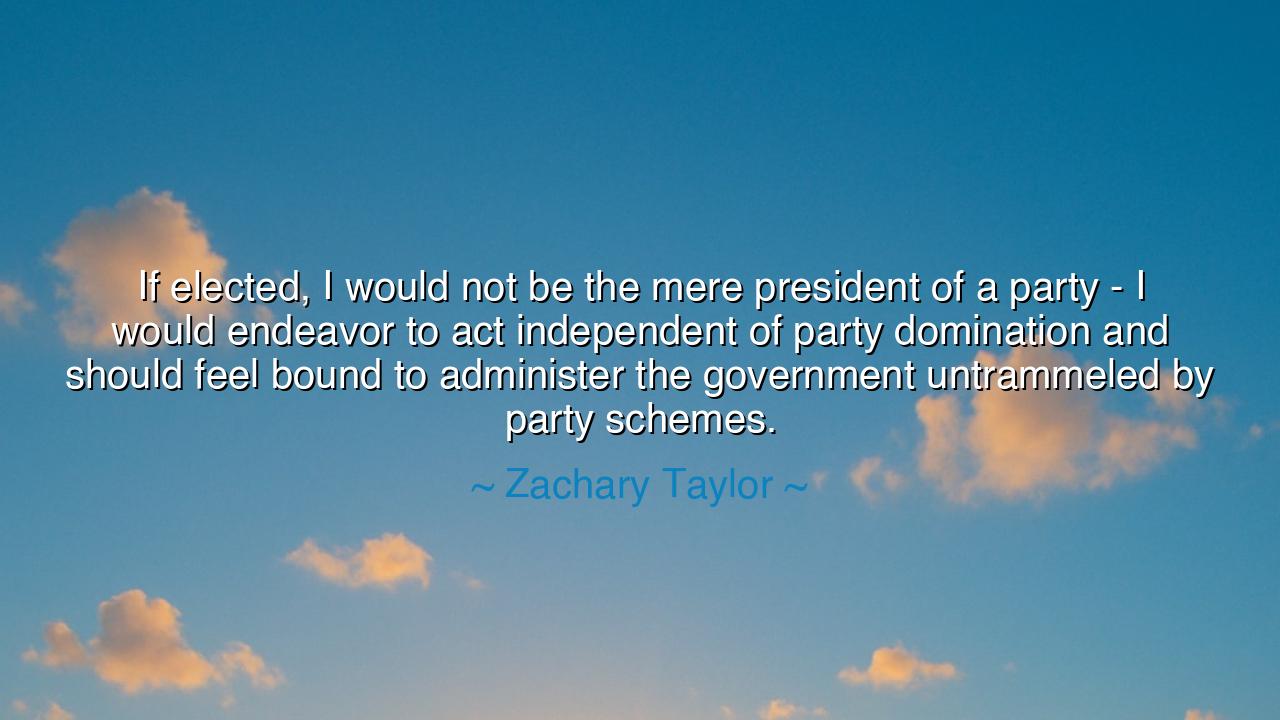
If elected, I would not be the mere president of a party - I
If elected, I would not be the mere president of a party - I would endeavor to act independent of party domination and should feel bound to administer the government untrammeled by party schemes.






Hear, O seekers of civic wisdom and virtue, the words of Zachary Taylor, the soldier-president who once declared: “If elected, I would not be the mere president of a party—I would endeavor to act independent of party domination and should feel bound to administer the government untrammeled by party schemes.” In these words lies a vision of leadership unshackled by faction, a call to govern for the people rather than for the machine of politics, and a reminder that true service to the Republic demands loyalty not to partisanship, but to principle. Taylor, though a warrior by trade and not a politician by birth, understood the corrosive power of division and sought to rise above it. His statement burns with the timeless wisdom that unity and independence of judgment are the lifeblood of good governance.
When Zachary Taylor spoke these words in the late 1840s, the United States stood divided along many lines—sectional, ideological, and moral. The wounds of party strife ran deep; the Whigs and Democrats waged their endless contest for power, often placing victory above virtue. Taylor, a general who had earned the nation’s trust on the battlefields of Mexico, entered the political arena as a man untainted by the intrigues of Washington. He saw that party domination could blind even the most capable leaders, turning statesmen into servants of political ambition rather than guardians of national good. Thus, he vowed that if chosen to lead, he would be “untrammeled by party schemes”, a free steward of the people’s welfare rather than a captive of partisan will.
The spirit of Taylor’s declaration reaches far beyond his time, for it echoes the ancient struggle between principle and power. From the days of the Roman Republic, when Cato the Younger stood against the corrupting influence of faction, to the founding of the American Republic, where George Washington warned in his Farewell Address against “the baneful effects of the spirit of party,” history has taught that when leaders become instruments of party, the public good is betrayed. Taylor’s words, therefore, are not mere campaign rhetoric—they are an invocation of that eternal ideal: that a ruler must be the servant of all, not the champion of one side.
Yet the irony of Taylor’s life was that even as he sought to transcend politics, politics ensnared him. His presidency, brief and tumultuous, was marked by rising tensions over slavery and states’ rights—divisions his independent spirit could not mend. But his intention, his moral stance against party domination, remains a noble lesson. For in an age when political allegiance often outweighed patriotism, he stood as a solitary figure of conscience, reminding his generation that a leader’s duty is not to serve a faction but to preserve the unity and justice of the nation.
Consider, too, the example of Abraham Lincoln, who decades later embodied the same principle. Though elected under a party banner, Lincoln’s moral compass always pointed beyond it. He refused to serve partisan ends, seeking instead the survival of the Union and the triumph of liberty. Like Taylor, he knew that when party dictates overrule conscience, democracy loses its soul. Their shared understanding—that leadership requires moral independence—is a truth that echoes through every age of governance.
Taylor’s words are also a warning to citizens themselves. For a government enslaved by party is not born from corrupt leaders alone, but from the blind loyalty of voters who prize victory over virtue. If citizens demand partisanship, they will receive division; if they demand independence of thought and moral clarity, they will receive leadership. The strength of a democracy, Taylor reminds us, lies not in the fervor of its factions but in the character of its conscience.
The lesson, then, is radiant in its simplicity: do not be ruled by factional loyalty, but by principle. In every age, seek leaders who are willing to stand alone for the sake of what is right. Let government be a tool of justice, not a weapon of division. Encourage those who govern to act freely, guided by reason and virtue rather than the demands of party politics. And let each citizen, in turn, guard their own independence of mind—for only through such courage can a republic remain whole.
Thus, Taylor’s declaration stands as both oath and oracle: that true leadership demands freedom from party domination, and that the highest calling of any ruler is to serve the whole people with integrity, courage, and impartiality. Let his words echo in every chamber of power and every heart that cherishes liberty—for the republic endures not through the triumph of parties, but through the wisdom of those who rise above them.






AAdministratorAdministrator
Welcome, honored guests. Please leave a comment, we will respond soon